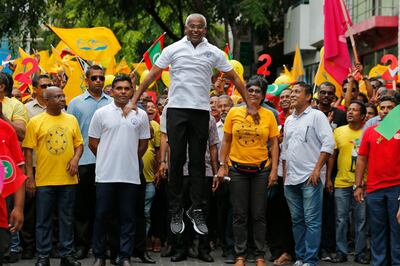Voting began on Sunday in a controversial presidential election in the Maldives, hours after police raided the opposition's campaign headquarters, officials and party workers said.
Hundreds of men and women lined up to vote before polling booths opened at 8:00 am (0300 GMT) in the capital Male, where President Abdulla Yameen and his challenger Ibrahim Mohamed Solih were due to cast their ballots.
The Maldives - a country of 1,200 islands and 260,000 people in the Indian Ocean is best known for its white beaches and blue lagoons. But it has also seen political opposition suppressed and press freedom curtailed in recent years under its strongman leader.
_________
Read more:
Maldives tourism thrives despite political crackdown
Ex-leader wants India to intervene to free Maldives judges
Maldives government in standoff with supreme court
_________
Will the poll nudge the Maldives back toward democracy, or further its spiral into autocracy? Here are five things to know:
- Who is the incumbent? -
Abdulla Yameen, a once mild-mannered civil servant turned strongman president, is seeking a second term in office.
The 59-year-old has ruled with an iron fist since 2013. The free press has been cowed, the military used to stave off impeachment, and most opponents - even Mr Yameen's own half-brother - have been jailed.
In a power struggle in February, President Yameen launched what the UN called an "all-out assault on democracy", declaring a state of emergency.
At its height, he sent soldiers to storm the Supreme Court and arrest judges who had ordered the release of political prisoners. Emergency rule was not lifted for 45 days.
- Who are the opposition? -

The opposition have fielded a joint candidate, the little-known Ibrahim Mohamed Solih, 54. But campaigning has been difficult, with many key figures in exile.
Mohamed Nasheed, an exiled opposition figure and former president, withdrew his candidacy after being barred from running. He was convicted of terrorism in 2015 in a trial widely viewed as politically motivated.
- Do they stand a chance? -
The odds are stacked in Mr Yameen's favour.
Rights groups say his regime has used harsh fines and vague decrees to silence dissent and impose censorship in the lead-up to polling day. Even wearing T-shirts emblazoned with pictures of opposition figures is out of bounds, local journalists say.
Human Rights Watch says new vote-counting rules adopted just days before the poll favour Mr Yameen and may deny Maldivians a right to choose.
The opposition has publicly expressed confidence that voters - at home and abroad - will come out against the regime. But it has accused Mr Yameen of laying the groundwork to "steal" this election.
- Why does it matter? -
There are broader geopolitical concerns at play.
The Maldives, like other smaller regional countries once firmly in India's orbit, has drifted closer to China in recent years, which has given hundreds of millions of dollars in loans to the atoll nation.
Beijing has been accused of seeking to develop facilities around the Indian Ocean - a so-called "string of pearls" - to counter the rise of its rival and secure its own economic interests.
The tropical archipelago is also a hugely popular holiday destination, attracting nearly 1.4 million foreigners in 2017.
- What could happen next? -

Election irregularities, or a repeat of February's constitutional hijinks, could see sanctions imposed.
The European Union said in July it was ready to impose travel bans and asset freezes on individuals if the situation did not improve.
The US State Department this month warned it would "consider appropriate measures" if the election was not free and fair.

